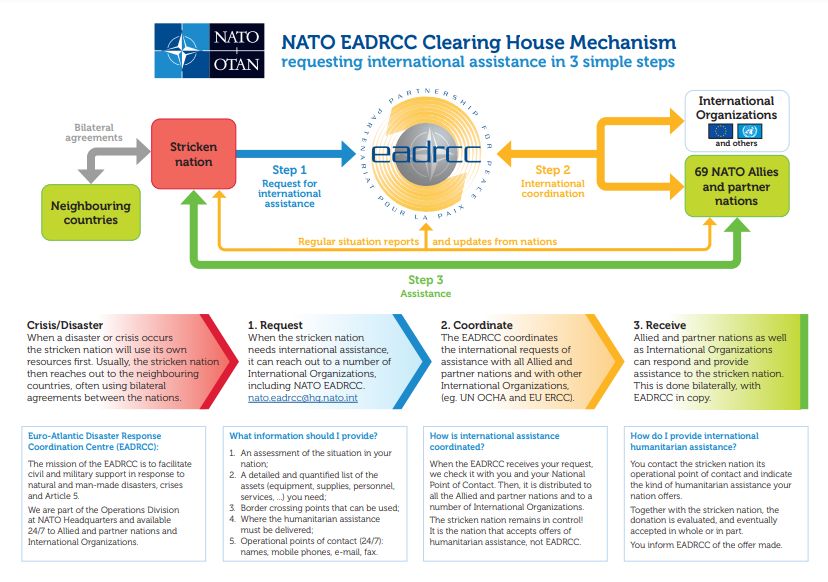NATO Euro-Atlantic Disaster Response Coordination Centre

The Euro-Atlantic Disaster Response Coordination Centre (EADRCC) is NATO’s principal civil emergency response mechanism. It is available to all Allies and partner countries, and can support them with both response and preparedness for disasters and other emergencies.
The EADRCC is NATO’s solidarity tool – Allies and partners can use it to support each other in a moment of need following a disaster or another emergency.
Through its capacity-building work and civil protection exercises, the EADRCC is helping Allies and partners improve their ability to work together in disaster response and build up their capabilities to cope with a wide range of emergencies. This is essential for national and collective resilience in the face of ever-growing challenges caused by climate change, terrorism and insecurity.
Support for national authorities in civil emergencies
In an emergency, the affected country can request support from NATO Allies and partners via the EADRCC. The Centre disseminates requests for assistance, coordinates offers and enables the swift delivery of assistance, working in close contact with the civil protection authorities of Allies and partners. The EADRCC can also help generate military assistance in disaster response, where necessary. And it provides situational awareness to Allies and partners about the emergency at hand, helping them take well-informed decisions. The EADRCC can support Allies and partners in a wide range of emergencies, from natural disasters, through acts of terrorism and other crises, all the way to collective defence situations. It has been an integral part of NATO’s response to the COVID-19 pandemic; NATO’s support to Ukraine’s civilian population against Russia’s aggression; the Alliance’s support to Turkiye following the 2023 earthquakes; the evacuation of NATO-affiliated Afghans and their families from Afghanistan in 2021, and many other natural and man-made disasters. In a crisis, the EADRCC coordinates closely with the NATO military authorities, the United Nations Office for the Coordination of Humanitarian Affairs (UN OCHA) and other international organisations involved in emergency response.

>>> View the full graphical representation of how assistance is coordinated through the EADRCC. >>>
Between 2020 and 2023, the EADRCC played a key role in NATO’s support to Allies and partners in dealing with the COVID-19 pandemic. The EADRCC helped facilitate the transfer of medical supplies such as masks, gloves, disinfectant and ventilators to countries that requested assistance.
In 2023, the EADRCC coordinated the Alliance’s support to Turkiye following the devastating earthquakes that would turn out to be the largest natural disaster in NATO’s history. Assistance was mobilised through civil and military means, and included shelter and other early support for the survivors.
In 2022-2023, the EADRCC was instrumental in NATO’s support for Ukrainian civilians affected by Russia’s war of aggression against Ukraine. Through the Centre, Allies and partners helped Ukrainian refugees, trained Ukrainian paramedics in Ukraine, and provided ambulances and essential supplies to first aid facilities in Ukraine.
Improving resilience through exercises
The EADRCC conducts regular capacity-building and training events in Allied and partner countries to enhance national resilience through improved disaster preparedness and ability to manage incidents and crises – from disaster response to broader security challenges.The Centre has organised 19 major civil protection exercises; the most recent one took place in 2021, in North Macedonia.
Multinational team of experts
The Centre is located at NATO Headquarters in Brussels, Belgium. It is staffed by a small team, but can be augmented substantially in a crisis. The EADRCC also relies on expertise from national civil experts, that can be called upon to provide advice in specific areas in the event of a major disaster.
Historical background
The EADRCC was established in 1998 by the Euro-Atlantic Partnership Council (EAPC) to support NATO’s Allies and partners with civil emergency planning and response.
Just a few days after its creation, the EADRCC was called upon to coordinate humanitarian assistance from EAPC countries to Kosovo refugees to Albania during the 1998 Kosovo war.
Throughout the years, the EADRCC’s mandate was periodically extended to include possible response to terrorist attacks, Chemical, Biological, Radiological and Nuclear incidents, and other emergencies. It has also been tasked to provide Allies, partners and the NATO military authorities with situational awareness about the evolution of crises and disasters, to help them take well-informed decisions.
The centre has been part of NATO’s response to a wide range of incidents, including the Ebola epidemic and the COVID-19 pandemic, refugee flows to Allied and partner countries, Russia’s war against Ukraine, major hurricanes, forest fires and floods, earthquakes, etc.
Today, the EADRCC is a tool in NATO’s collective defence toolbox, its crisis management toolbox, and its partnership toolbox.
Website: https://www.nato.int/cps/en/natohq/topics_52057.htm?